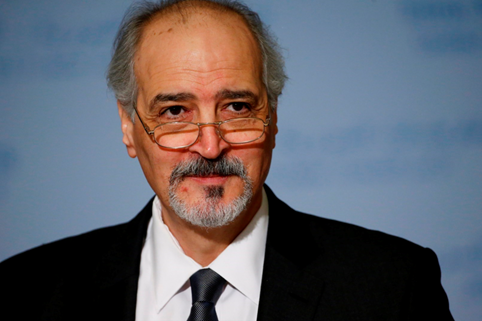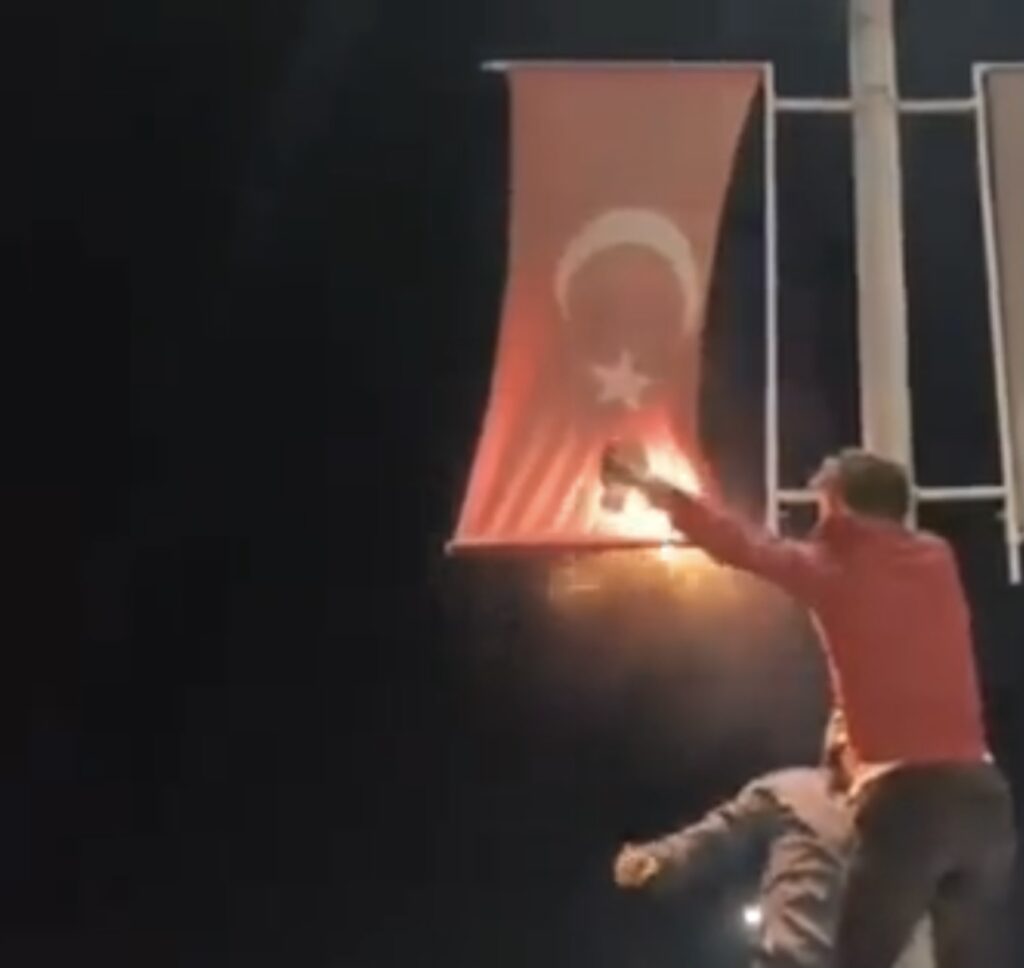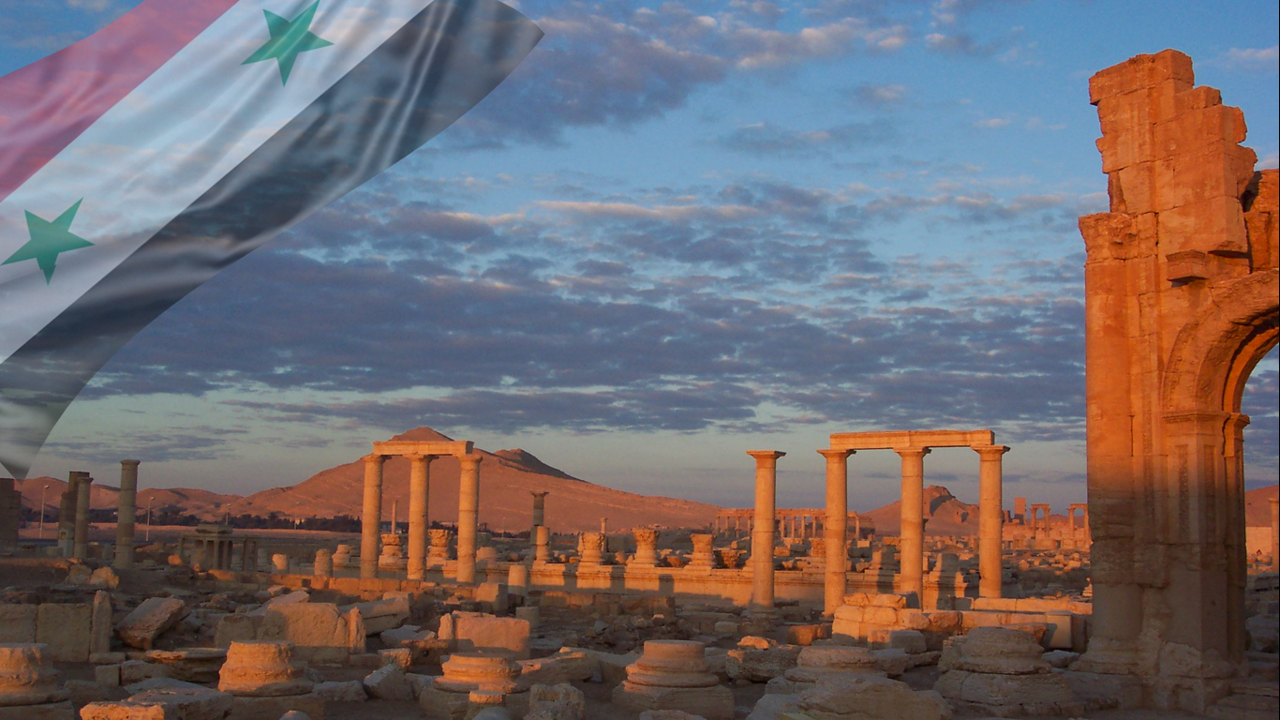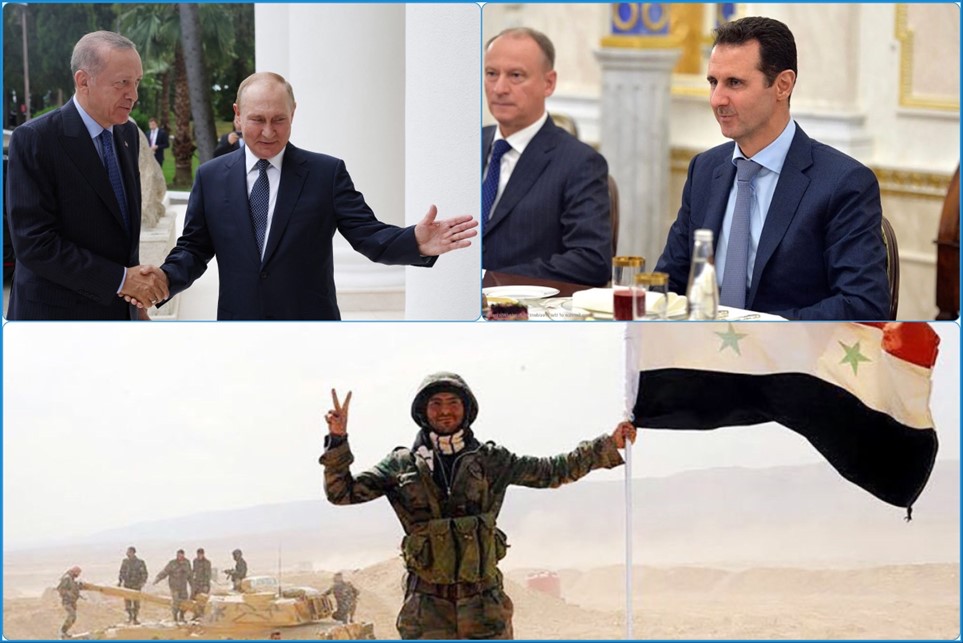On 5 October 2022 Syria’s possible best diplomat Baššār al-Ğa‘afarī got officially appointed as Damascus’ new ambassador to Moscow. This came as almost a shock, since the appointment of al-Ğa‘afarī, who worked as a Syrian permanent representative in the U.N. between 2006 and 2020 and became a legend defending his country from foreign invasion there, came almost a disgrace. And caused quite a controversy. Given his experience, skills, and fame even his post until now as Deputy Foreign Minister was somewhat below him, but to waste such a person as a mere ambassador, especially to a country with which relations are already handled in the highest possible political and military level way above the ambassadors is hard to explain. And it was guessed that he might just get sidelined become inconvenient, or have trust lost in him. Yet it seems that quite the contrary is the truth.
It was soon pointed out that in this new appointment, which had no foreshadowing at all, he was tasked to lead Turkish-Syrian negotiations for reconciliation that are to be launched in Moscow, with Russian mediation, and under Russian supervision. And for such negotiation, there is no more suitable person in Syria now. Thus this development seems more than reasonable.
There have been several notions since the summer for attempted Turkish approaches to Syria to start direct negotiations on how to end the turmoil between the two states. As it was also reported that President Erdoğan is also ready to meet President al-Asad in person, though always in a very conditional context.
So far all such attempts have been firmly rejected by Syria making it very clear that no negotiations can start until there is Turkish occupation on Syrian soil. Which is still the case. And since these rumors and Ankara’s suggestions to launch yet another military operation in Syria the Russian and Syrian forces greatly intensified their strikes against the Turkish-supported militant in Idlib.
With this development, which might seem mild several things changed once and for all. The last Tehran Summit in the summer has indeed become a milestone. There will be no new Turkish operations. The Geneva and the Astana settlement processes came to a definite end, and at the final settlement, there will be no outer partners, only Syria, Türkiye, and Russia. Closing this chapter there will be no role here for the U.S., or the Europeans, but nor for Iran. Russia will settle this matter, as its conflict in Ukraine intensifies.
Who is Baššār al-Ğa‘afarī?
Before we go into the details, we have to see who is Baššār al-Ğa‘afarī to truly grasp the magnitude of this development. To understand that this is not a small step at all.

The Damascus-born politician, now aged 66, started his diplomatic career in the ‘80s, after receiving a very thorough education. Besides Damascus, he studied in Paris and Indonesia and held diplomatic positions in both of these theaters. He speaks excellent French and English, which is not rare among Syrian politicians. He was on route to becoming one of the many career diplomats of Syria, a more trusted and talented one perhaps than usual, until 2006 when he returned to work in Syria’s U.N. mission, this time as a permanent representative.
He made famous after 2011 when pressure was huge on Syria and he himself was constantly lashed out against. His remarks and skills in defending his country in the U.N., many times against fellow Arab countries, made him legendary in Syria, reaching fame previously only gained by military generals.
Trust was never shaken in him and Damascus held him in position long after his official time ended. It was only in November 2020, when another legend of Syrian diplomacy Foreign Minister Walīd Mu‘allim passed away that al-Ğa‘afarī got recalled from New York. Though most opinions guessed him becoming the new Foreign Minister, seniority prevailed Fayṣal al-Miqdād got appointed, while al-Ğa‘afarī was tasked to be his deputy. A post seldom filled before in Syria. In this position al-Ğa‘afarī’s fame started to fade – which many voices guessed to be intentional -, though his experiences were badly needed after the war practically proved ended in the military sense and the perilous task of hammering out reconciliations with all former adversaries started.
All this important to see that his appointment was not just sending a new and trusted diplomat to the otherwise very important post of Moscow in a very delicate time. He is a huge legend in Syria, and it was hard to swallow that just a character would be sent to an embassy, which has little career weight now. It seemed much more like a retirement. Unless the news is true that he would lead the negotiations under Russian auspices with the Turkish side. Because for this task it would be hard to find anyone more suitable.
This is because even though Russian orientation is very strong in Syrian diplomacy, he is actually far from this line. He was for long from the pro-French, or pro-Western camp and has no significant experience with the Russians. However, he is skilled and experienced, especially in the U.N., meaning he knows well how to hammer out a deal that “can be sold” internationally as well.
The wind started to change
While there is semi-conformed news about Damascus finally green-lighting the negotiations with Türkiye in Moscow and which is about to be led by Baššār al-Ğa‘afarī, the question is whether such negotiations are viable and is there any real readiness for it. Interestingly, the wheels of this machine are rolling for months now.
It was in May 2022, when Turkish President Recep Tayyip Erdoğan announced that soon a new Turkish military operation would start in Syria unless the Kurdish threat is neutralized. This refers to the constant clashes in Northern Syria between the militant groups financed by Türkiye, and the local Kurdish militias, mostly loyal to the American proxy Syrian Democratic Forces (Qasad). This was Ankara’s last gamble to shift the balance in the Syrian case, as it has become clear that one way or another the Turkish side wants to end this long attrition of resources and military power.
And then came the infamous Tehran Summit of the Astana Process in July, with which we have dealt in length before. In this summit, Erdoğan once again confirmed the principles of the Astana settlement process, and with this, the possibility of a new military strike subtly got off the agenda. Probably once and for all, roughly at the same time, Ankara launched an anti-Kurdish operation in Iraq.
That is the time when diplomatic signals from Ankara for a direct engagement and a reconciliation with Damascus suddenly surged. This also reveals that the prospect of the new military campaign was a huge gamble, a bluff to set things in motion.
Though the Tehran Summit aimed to create a united position about the Syrian crisis between Russia, Türkiye, and Iran, a Syrian delegation was also present led by Foreign Minister Fayṣal al-Miqdād. Which clearly expressed its criticism against Ankara, subtly signaling to both Iran and Russia that Damascus wants help and pressure on the Turkish sides, not mediation. And “miraculously” the tone of Ankara after the Tehran Summit suddenly changed.
In late July 2022 Turkish Foreign Minister Mevlüt Çavuşoğlu in a tv interview stated that Türkiye held discussions about solving the Syrian crisis because so far both the American and the Russian attempts have failed. More significantly, in the end, Ankara is ready to give all its political and military support to Damascus to neutralize the terrorist threat in Syria. Once again, this came only a few days after the Tehran Summit.
It was not much, but beyond being the first official signal for a direct reconciliation it had two groundbreaking implications. First, Ankara admitted to trying and failing to play Washington and Moscow against each other and both have turned it down to carve something permanent out of the Syrian gamble. So it turned to Iranian mediation, which is much more suitable for the Syrian government, as the ties between Damascus and Tehran are much more built of mutual trust. Yet the fact that Tehran never openly mentioned this mediation, nor it ever reacted to the Turkish notions shows that while it is almost certainly true, Damascus rejected the offer and there was only so much the Iranian side could do. Secondly, for the first time since 2011, when the Turkish government-backed terrorist organizations fought against the Syrian government and recognized the opposition groups – which until now still reside in Istanbul -, the Turkish state leadership openly acknowledged the Syrian government as the representative of the Syrian people. Implicitly Ankara admitted that it is the Syrian government that has de facto control over the country. Compared to that it was secondary that the offer was a clever ploy to gain support for renewed military invasion officially fighting against the Qasad, but actually carving out a permanent foothold on Syrian soil. And naturally, the offer for direct engagement was turned down.
But the wheels were in motion and Turkish diplomacy was not about to back down. On 9 August 2022, the Turkish media reported that President Erdoğan while visiting Sochi on 5 August discussed the Syrian matter with President Putin and the Russian President suggested that Erdoğan should have a direct phone conversation with Syrian President al-Asad. To which allegedly Erdoğan agreed. So it was suggested that such a direct discussion can happen very soon, and Ankara was ready for it. It is important to notice that all this is coming from the Turkish side, while no Russian or Iranian source confirmed this. Thus suggesting an open offer for direct talks to Damascus. Which the Syrian side – also thought the media – bluntly turned down. Clearly stating that Damascus is aware that all this is just a ploy, Türkiye has commitments it never fulfilled, sponsors terrorist groups in Syria, breaches Syrian sovereignty, and tries to annex lands, which all has to end before any possible direct engagement. However, this is the first time we came to hear about a strong Russian mediation that is pressing Damascus to accept direct negotiations.
On 10 August at the annual conference of the Turkish diplomatic corps in Ankara Foreign Minister Çavuşoğlu went one step further and openly stated that Türkiye has no territorial desires in Syria. This is significant because this was a strong demand by a number of chauvinistic groups in the Turkish parliament for a long and also the accusation of Damascus that in fact, that is what Ankara is doing in the region. At the same forum Çavuşoğlu also stated that Syria must not be allowed to be taken apart, it must have a strong central government, and the solution can only come via a reconciliation between the Syrian government and its opposition. This must have been a shock to the Turkish-financed opposition groups, which still claim that their aim is to topple the Syrian government. It signaled that Ankara is bargaining and signaling that it can let the support of the opposition and the militants go. Though only in case they reconcile with the Syrian government, in other words becoming a part of it, which Damascus obviously won’t accept. Because it cannot accept.
Also on the same diplomatic forum, Çavuşoğlu claimed that he has already met directly with his Syrian counterpart al-Miqdād a year before in Belgrade on an international forum and they had a brief discussion. This was a breakthrough, as even before there were direct contacts between the Syrian and the Turkish sides, however, these were always limited to military and intelligence discussions focusing on very specific matters and always involving third-party mediation. This is the first time to hear that there was a high-level political contact between the two sides. Though as we only came to hear about it a year later the result is clear.
Çavuşoğlu’s remarks indeed caused a shockwave, as the day after in the Turkish-occupied Northern Syrian lands a whole insurrection broke out. Turkish flags were burned, military posts attacked and the Turkish military had to apply brute force to break the uprising. This was truly problematic for Ankara, as there is already major infighting between the Turkish-backed terrorist groups, and now the so far most reliable factions turned on the Turkish troops. A few days later 3 Turkish soldiers died in Northern Syria in a surprise attack, and since then the sporadic clashes are constant, while the Syrian and the Russian forces intensified their precision strikes on the Turkish-backed militant. Though carefully avoiding the Turkish troops.

This political agenda was reinforced and even expanded on 19 August 2022, when Turkish President Erdoğan, who once famously stated that he will soon pray in the Umayyad Mosque in Damascus, confirmed that Ankara has no territorial claims in Syria and that he is ready to directly negotiate with President al-Asad. In the same statement, his usual rhetoric turns heavily criticizing the Americans accusing them of supporting terrorism in Syria, which much be stopped. Yet he also pointed out that he is not only ready to engage in direct negotiations with President al-Asad, but also that Ankara “must” take the first initiative. This statement meant the first open and undeniable admission that Ankara abandoned the “regime change” policy towards Syria.
Though Damascus was not reacting to this signal either, only mildly downplaying it in sporadic media comments something was indeed going on behind the scenes. Russian and Iranian mediation must have been heavy, as on 23 August the Iranian Tasnīm reported that President Erdoğan and President al-Asad may soon meet in Uzbekistan at the next annual meeting of the Shanghai Cooperation Organization. Both the source and the significance of this are important. The Tasnīm is the outlet of the Iranian Foreign Ministry, therefore it says that Iran is indeed mediating between Damascus and Ankara. And it also shows that Damascus is not completely rejecting the offer now. The meeting was also very important for Iran, as later on in September when the forum was held Iran was officially accepted as a member state, while Türkiye announced its desire to join. According to this report Russia invited Syria to the Shanghai Forum to lay down the path of Syria’s eventual joining the association, though it is easy to see what the main objective was behind the invitation, as Putin himself invited Erdoğan as well.
The same Iranian report stated what was confirmed later on by other sources as well that veteran Turkish politician Doğu Perinçek will soon lead a Turkish delegation to Syria. Perinçek is the head of the otherwise almost insignificant Vatan Party, a strong critic of Western-oriented foreign policy, and a strong advocate of Middle Eastern solidarity, he has very influential ties in the Turkish deep state and is a close ally of President Erdoğan. He has been a strong supporter of a Turkish policy of not attacking but actually helping Syria, which so far was put on hold. Now it became picked up, though until now nothing came of the promised visit.
On the very day of the Iranian report Foreign Minister Çavuşoğlu once again stated that there is a readiness for direct talks with Syria for reconciliation, and also that Ankara has no preconditions. He also added that there are already direct negotiations between the two sides on the intelligence level, hinting that preparations are ongoing for a settlement.
The next twist came on 13 September 2022, only two days before the Shanghai Cooperation Association’s meeting in Samarkand, when the Russian Sputnik claimed Turkish authorities informed the Syrian opposition residing in Istanbul that they have to leave the country soon, their payment will end and have to move their headquarters to somewhere else. It was soon denied by the Syrian opposition group, but not by the Turkish authorities. It is very likely that it was yet another signal from Moscow that this is the next step expected from Ankara for a breakthrough.
So far nothing came of it and the Shanghai Forum’s meeting went down without President al-Asad attending it. So both the direct and the indirect approaches were so far turned down by Damascus, though that doesn’t mean Ankara is not trying. Latest on 6 October visiting Prague to meet with EU leaders and responding to a press question President Erdoğan once again confirmed that he is ready to meet the Syrian President when the time comes. Yet more significantly he also stated that there are negotiations on the way, even if he claimed these to be low-level ones.
That is where we are now. That is exactly why the appointment of Baššār al-Ğa‘afarī important. Because Damascus does not deny that there would be negotiations behind the scenes, nor the reports that al-Ğa‘afarī would be leading negotiations with the Turkish side. So if that is true, this is the first open gesture by the Syrian state to start a rapprochement process with Ankara. And not just any gesture.
Damascus is either buckling under Russian pressure to put an end to the crisis and accept any price, or the intensified Russian and Iranian mediation managed to bear fruit.
Is it possible?
In this regard, however, the question is: Could there be a real reconciliation? In fact in the history of modern Syrian-Turkish relations that would not be unprecedented. The two states had a particularly troubled period in the ‘80s and the early ‘90s when NATO member Türkiye was very aggressive towards Syria, which in exchange lent huge support to the Kurdish insurgency. That was until Türkiye amassed troops on the border and openly threatened to go to war unless Damascus changes policy. The result was the infamous Adana Accords in 1998 starting a full reconciliation and leading up to excellent bilateral political and economic ties all the way to 2011. So it would not be unprecedented for these two states to have a full restart in their ties, even after the worst possible terms. Of course, now, the crisis went much further and lasted longer.
The question is what the two sides want and how much they can reconcile. Actually, the objectives are not that far apart. Syria wants all Turkish troops to leave to regain territorial integrity and gain a diplomatic card against Washington to finally leave the country. It also wants Ankara to support its approach. With this step, Damascus would start to disarm or incorporate the Kurdish militias in the North, which would help to erode Qasad which the Americans rely on.
Turkey also wants to end its military engagement, as it is costly, and has already accepted that the final objective to have a vassal government in Damascus will not happen. It still has high hopes for the Syrian opposition being incorporated into the Syrian government, thus gaining leverage on the Syrians later on, but realistically neither Syrian sides are ready for that, and Ankara in the end will have to give up this card. Much more importantly Ankara wants to see military forces all along its borders not sympathetic to the Kurdish militias and not letting incursions happen. That is acceptable for both Moscow and Damascus, which are ready to halt American attempts to build up a strong Kurdish entity here.
The problematic part is the matter of the Turkish armed and backed militias and the question of the refugees. During the last few years while occupying Syrian lands Türkiye has engaged in a Turkification process hoping to gain a foothold here. It also armed thousands of militant mercenaries, many of them not even Syrians, who were very useful tools in Libya, Azerbaijan, and other areas. Ankara also wants to move millions of Syrian refugees back to Syria. So far the plan was to push them back to the occupied territories in the North, but these refugees themselves were very reluctant to return to a war front, while Ankara did not allow them to return to other parts of Syria. So the last major issue between Ankara and Damascus is how to disarm, neutralize and handle the thousands of militants, and how to handle the refugees. Damascus is ready to accept the refugees, though with some conditions, but logically refuses to allow the militants to stay, especially the non-Syrians. And until there is a deal here, Turkish troops remain to keep up the pressure.
The real matter is how to solve this question without Ankara taking responsibility for these militant groups, or moving them to the Turkish heartland, which is a very dangerous move to do. And it is not at all a coincidence that since these steps were taken for reconciliation huge infighting broke out in Idlib between the Turkish-backed militants, while the Syrian and Russian forces keep pounding them.
Can the war come to an end?
By now, it has to. Militarily it practically has. What is left is to end the Turkish presence before once again a major military operation starts, which is not for the benefit of any side. Though ironically Syria is the readiest to take the losses, as its economy is already in ruins.
Türkiye has way bigger problems now than squandering resources to this dead-end project, which by now will not yield results. The very sensitive deals with Russia also dictate a swift closure. And we should not forget that next year elections are coming in Türkiye, in which Erdoğan cannot be sure to win. For him ending the Syrian case and starting to move the refugees would be a great campaign victory, as this matter has already caused huge tensions in the country.
The question is how far Ankara and Damascus are ready to go and how big sacrifices they are willing to make. How effective the Iranian, Arabic, and Russian mediation can be. How much pressure Moscow can, or is willing to put on Ankara? And most importantly: Will America allow this to happen?
The next period will be more than interesting to see how relations are forming and a surprise can come any minute. There is a golden opportunity now, as the world is busy.


